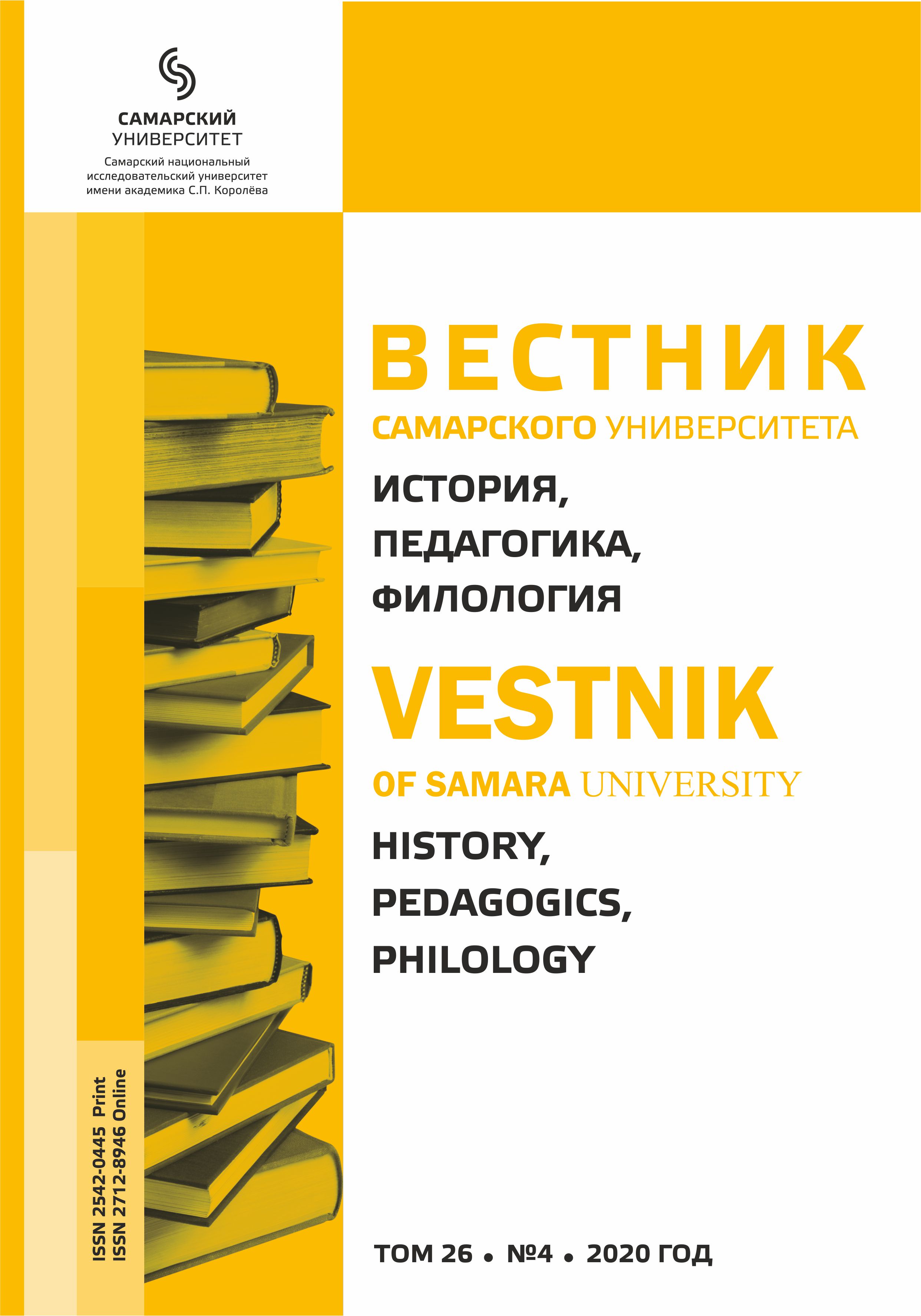Parametric status of the subject of utterance
- Authors: Danilova N.K.1
-
Affiliations:
- Samara National Research University
- Issue: Vol 26, No 4 (2020)
- Pages: 88-94
- Section: Articles
- URL: https://journals.ssau.ru/hpp/article/view/8264
- DOI: https://doi.org/10.18287/2542-0445-2020-26-4-88-94
- ID: 8264
Cite item
Full Text
Abstract
The article proposes a possible solution to the problem of the poly-subjectness of narrative discourse, associated with the hybrid nature of artistic communication, in which not only the world of narration is modeled, but also the communicative situation of communication. As one of the parameters of the discursive process, the analysis of which makes it possible to observe the intensive interaction of a number of systems participating in modeling the imaginary world of a work of art, the subject of the statement is considered, in M. Foucault's terminology, an «empty position» in discourse. The narrative text can be viewed as a complex of a number of communicative phenomena, as a special type of social interaction. A speech act, in which the text becomes an integral component, represents, according to this point of view, a two-unit complex of events, the process of the speaker's production of an utterance and the process of interpretive perception of the finished speech product. The interaction of the author and the reader takes place at the point «I» – «here» – «now» (Origo), in which an event takes place, which in the theory of the speaking subject of Yu. Kristeva is defined as «passing the zero position» subject of evocation-process and statement-result. In a complexly structured artistic message, the dynamics of the subject of utterance is expressed in the alternation of pronoun forms. In the structure of discourse, the subject of utterance forms a position, filling which the grammatical subject realizes the relationship between the grammatical and the communicative system, which represents a complex perspective of communication. The «observer's area», which determines the communicative situation of narrative discourse, completely excluding interpersonal relations (this is what Bakhtin means when he speaks of the absence of dramatic relations between the author and the reader). The introduction of the observer category makes it possible to describe the position of «out-of-access», according to which the author is on the border of fiction. The perspective of the «observer» explains another feature of literary communication, described by M.M. Bakhtin as «the birth of meanings at the moment of meeting (dialogue) of the consciousnesses of both participants».
About the authors
N. K. Danilova
Samara National Research University
Author for correspondence.
Email: danilova_nina@mail.ru
ORCID iD: 0000-0002-8854-2650
Doctor of Philological Sciences, professor, professor of the Department of German Philology
Russian Federation, 34, Moskovskoye shosse, Samara, 443086, Russian FederationReferences
- Barwise, Perry 1987 – Barwise J. and Perry J. (1987) Situationen und Einstellungen. Grundlagen der Situationssemantik. Berlin; New York: Walter der Gruyter, 430 S. DOI: http://doi.org/10.1515/9783110846744.
- Habermas 1984 – Habermas Jürgen (1984) Vorstudien und Ergänzungen zur Theorie des kommunikativen Handelns. Frankfurt: Suhrkamp, 605 S.
- Motsch 1991 – Motsch Wolfgang (1991) Anforderungen an eine modulare Textanalyse. In: Originalveröffentlichung Sprache und Pragmatik, Arbeitsberichte, Jg. 24, S. 47–61. Available at: https://ids-pub.bsz-bw.de/frontdoor/deliver/index/docId/7421/file/Motsch_Anforderungen_an_eine_modulare_Textanalyse_1991.pdf.
- Zeman et al 2017 – Zeman Sonja, Blanck Wiebke, Ott Christine, Rödel Michael, Staffeldt Sven (2017) Was bedeutet eigentlich erzählen? Linguistische und didaktische Annäherungen an einen schwierigen Begriff. In: Mitteilungen des Deutschen Germanistenverbandes. Göttigen: V&R unupress, S. 307–329. DOI: http://doi.org/10.14220/mdge.2017.64.3.307.
- Arutyunova 1988 – Arutyunova N.D. (1988) Types of linguistic meanings: Assessment. Event. Fact. Moscow, 340 p. Available at: https://www.booksite.ru/fulltext/arutunova/text.pdf. (In Russ.)
- Bakhtin 1979 – Bakhtin M.M. (1979) Aesthetics of verbal creativity. Complier Bocharov S.G., notes Averintsev S.S. and Bocharov S.G. Moscow: Iskusstvo, 423 p. Available at: http://teatr-lib.ru/Library/Bahtin/esthetic. (In Russ.)
- Golubeva 2010 – Golubeva N.A. (2010) Cognitive principles, mechanisms and operations in grammar. Proceedings of Voronezh State University. Series: Linguistics and intercultural communication, no. 1, pp. 32–35. Available at: http://www.vestnik.vsu.ru/pdf/lingvo/2010/01/2010-01-05.pdf. (In Russ.)
- Zolotova, Onipenko, Sidorova 1998 – Zolotova G.A. Onipenko N.K. and Sidorova M.Yu. (1998) Communicative grammar of the Russian language. Moscow, 528 p. Available at: https://www.elibrary.ru/item.asp?id=19809866; https://www.studmed.ru/zolotova-g-a-onipenko-n-k-sidorova-m-yu-kommunikativnaya-grammatika-russkogo-yazyka_9969a984bbb.html. (In Russ.)
- Kolesov 2008 – Kolesov I.Yu. (2008) Towards the notion of mental scene in conceptual language analysis. Issues of Cognitive Linguistics, no. 2 (15), pp. 19–31. Available at: https://www.elibrary.ru/item.asp?id=11664841. (In Russ.)
- Tarasov 1987 – Tarasov E.F. (1987) Trends in the development of psycholinguistics. Moscow, 168 p. Available at: https://iling-ran.ru/library/psylingva/Tarasov%20E.F.%20Tendenzii%20razvitiia%20psicholingvistiki.djvu; https://www.elibrary.ru/item.asp?id=21628147. (In Russ.)
- Tyupa 2002 – Tyupa V.I. (2002) Artistic discourse (introduction to the theory of literature). Tver: Tver. gos. un-t, 80 p. Available at: https://www.studmed.ru/tyupa-vi-hudozhestvennyy-diskurs-vvedenie-v-teoriyu-literatury_0ff167e3365.html; https://b-ok.global/book/2728151/8375b2. (In Russ.)
- Shabes 1989 – Shabes V.L. (1989) Event and text. Moscow: Vysshaia shkola, 175 p. Available at: https://superlinguist.ru/lingvistika-teksta-skachat-knigi-besplatno/shabes-v-ia-sobytie-i-tekst.html. (In Russ.)
- Schmidt 1978 – Schmidt S.J. (1978) «Text» and «story» as basic categories. In: New in foreign linguistics. Issue VIII. Linguistics of the text. Moscow: Progress, pp. 89–108. Available at: https://istina.msu.ru/publications/article/2767978/; https://vk.com/doc30601958_459204609?hash=7d74f2c6eab3deb829&dl=6530892d3cf88ac7d7. (In Russ.)
- Eko 2005 – Eko Umberto (2005) Notes on the margins of the «The Name Of The Rose». Translation from Italian by E.A. Kostyukovich (1988). Saint Petersburg, 96 p. Available at: https://massolit.top/book/zametki-na-polyah-imeni-rozi. (In Russ.)
Supplementary files













